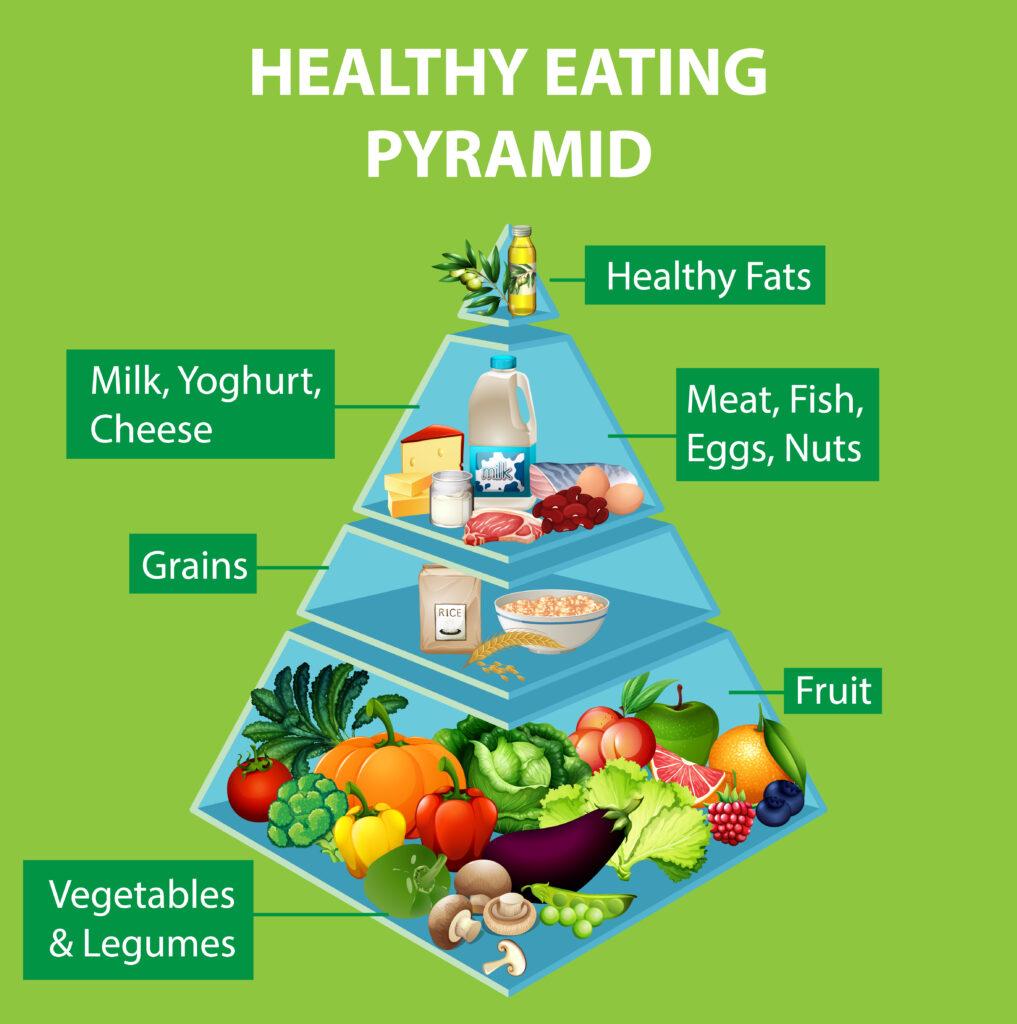Article Outline
- Introduction
- Why Is a Healthy Diet Important?
- Benefits of a Healthy Diet
- Key Components of a Healthy Diet
- Macronutrients and Micronutrients
- Balancing Caloric Intake
- Whole Foods and Processed Foods
- Planning and Preparing Healthy Meals
- Meal Planning Tips
- Grocery Shopping Tips
- Healthy Cooking Methods
- Portion Control and Mindful Eating
- Understanding Portion Sizes
- Mindful Eating Techniques
- Incorporating Variety and Moderation
- Food Variety and Nutritional Adequacy
- Moderation in Food Choices
- Hydration and Healthy Beverage Choices
- Importance of Hydration
- Choosing Healthy Beverages
- Strategies for Overcoming Challenges
- Social Situations and Peer Pressure
- Emotional Eating and Stress Management
- Physical Activity and Its Role in a Healthy Diet
- Benefits of Regular Exercise
- Combining Diet and Exercise for Optimal Health
- Monitoring Progress and Seeking Professional Help
- Self-Monitoring Techniques
- Consulting Registered Dietitians or Nutritionists
- Conclusion
- FAQs
- How can I resist unhealthy food cravings?
- Is it necessary to count calories to maintain a healthy diet?
- Can I have cheat meals while following a healthy diet?
- What are some healthy snack options?
- How long does it take to see results from a healthy diet?
Strategies to Maintain a Healthy Diet
Introduction
Maintaining a healthy diet is essential for overall well-being and longevity. It is not just about what you eat but also about making informed choices and developing healthy habits. This article explores various strategies to help you maintain a healthy diet, focusing on key components, meal planning, portion control, incorporating variety and moderation, hydration, overcoming challenges, the role of physical activity, and monitoring progress.
Why Is a Healthy Diet Important?
A healthy diet offers numerous benefits that impact your physical and mental well-being. It provides essential nutrients, vitamins, and minerals necessary for optimal bodily functions. A balanced diet reduces the risk of chronic diseases, improves energy levels, promotes a healthy weight, enhances cognitive function, and strengthens the immune system.
Key Components of a Healthy Diet
Macronutrients and Micronutrients
A healthy diet comprises macronutrients and micronutrients. Macronutrients include carbohydrates, proteins, and fats, which provide energy and support various bodily functions. Micronutrients, such as vitamins and minerals, are essential for growth, development, and overall health. Balancing the intake of macronutrients and ensuring sufficient micronutrient consumption is crucial for a healthy diet.
Balancing Caloric Intake
Maintaining a healthy weight is often a goal associated with a healthy diet. Balancing caloric intake involves consuming an appropriate number of calories based on your age, gender, activity level, and health goals. Understanding your caloric needs and making mindful choices can help you achieve and maintain a healthy weight.
Whole Foods and Processed Foods
A healthy diet focuses on whole, unprocessed foods that are rich in nutrients and low in additives. Whole foods include fruits, vegetables, whole grains, lean proteins, and healthy fats. Processed foods, on the other hand, are often high in added sugars, unhealthy fats, and sodium. Minimizing the consumption of processed foods and opting for whole foods contributes to a healthier diet.
Planning and Preparing Healthy Meals
Meal Planning Tips
Meal planning is an effective strategy for maintaining a healthy diet. It involves organizing and preparing meals in advance to ensure they are balanced and nutritious. Start by creating a weekly meal plan, including breakfast, lunch, dinner, and snacks. Consider your nutritional needs, food preferences, and schedule when planning meals. Make a shopping list based on the meal plan to avoid impulsive purchases of unhealthy foods.
Grocery Shopping Tips
When grocery shopping, stick to the perimeter of the store where fresh produce, lean proteins, and dairy products are usually located. Fill your cart with a variety of colorful fruits and vegetables, whole grains, and lean proteins. Read food labels to make informed choices and avoid products high in added sugars, unhealthy fats, and artificial additives.
Healthy Cooking Methods
The way you prepare your meals can significantly impact their nutritional value. Opt for healthier cooking methods such as grilling, baking, steaming, or sautéing instead of deep-frying or pan-frying. These methods retain the nutrients in the food while minimizing the use of added fats and oils.
Portion Control and Mindful Eating
Understanding Portion Sizes
Portion control plays a vital role in maintaining a healthy diet. Understanding appropriate portion sizes can prevent overeating and support weight management. Use visual cues or measuring tools to familiarize yourself with recommended serving sizes. Focus on consuming balanced portions of proteins, carbohydrates, and vegetables.
Mindful Eating Techniques
Mindful eating involves paying attention to your food choices, savoring each bite, and listening to your body’s hunger and fullness cues. Slow down while eating, chew your food thoroughly, and savor the flavors. Avoid distractions such as TV or electronic devices, as they can distract you from being fully present during meals. Be aware of your body’s signals of hunger and satiety, and eat until you feel comfortably satisfied, rather than overly full.
Incorporating Variety and Moderation
Food Variety and Nutritional Adequacy
Including a variety of foods in your diet ensures that you receive a wide range of nutrients. Different foods offer unique combinations of vitamins, minerals, and phytochemicals that contribute to overall health. Aim to incorporate fruits, vegetables, whole grains, lean proteins, and healthy fats from different sources into your meals. This promotes nutritional adequacy and prevents nutrient deficiencies.
Moderation in Food Choices
While variety is important, it’s also essential to practice moderation when it comes to certain foods. Foods high in added sugars, unhealthy fats, and excessive salt should be consumed in moderation. This includes sweets, sugary beverages, processed snacks, and fried foods. Enjoy these indulgences occasionally and in smaller portions to maintain a balanced diet.
Hydration and Healthy Beverage Choices
Importance of Hydration
Staying hydrated is crucial for overall health and well-being. Water is essential for various bodily functions, including digestion, nutrient absorption, temperature regulation, and detoxification. Aim to drink an adequate amount of water throughout the day to maintain proper hydration. The general recommendation is to consume at least 8 cups (64 ounces) of water per day, but individual needs may vary based on factors like activity level and climate.
Choosing Healthy Beverages
While water is the best choice for hydration, there are other healthy beverage options available. Herbal teas, infused water, and homemade fruit juices without added sugars can provide flavor and hydration. Limit the consumption of sugary drinks such as soda, energy drinks, and sweetened juices, as they contribute to excess calorie intake and can negatively impact health.
Strategies for Overcoming Challenges
Social Situations and Peer Pressure
Maintaining a healthy diet can be challenging in social situations or when faced with peer pressure. Communicate your dietary preferences or restrictions to friends and family, so they can support your choices. Offer to bring a healthy dish to social gatherings, or suggest activities that don’t revolve solely around food, such as going for a walk or engaging in other shared interests.
Emotional Eating and Stress Management
Emotional eating is a common challenge when it comes to maintaining a healthy diet. Find alternative ways to manage stress and emotions without turning to food. Engage in activities that help you relax and unwind, such as practicing yoga, meditation, or deep breathing exercises. Seek support from loved ones, and consider professional help if emotional eating becomes a persistent issue.
Physical Activity and Its Role in a Healthy Diet
Benefits of Regular Exercise
Physical activity goes hand in hand with a healthy diet for overall well-being. Regular exercise offers numerous benefits, including weight management, improved cardiovascular health, increased strength and flexibility, enhanced mood, and reduced risk of chronic diseases. Aim for at least 150 minutes of moderate-intensity aerobic activity or 75 minutes of vigorous-intensity activity each week, along with muscle-strengthening activities on two or more days.
Combining Diet and Exercise for Optimal Health
A healthy diet and regular physical activity work synergistically to optimize health. Proper nutrition fuels your body for exercise, providing the necessary energy and nutrients for optimal performance. Exercise, in turn, enhances the effectiveness of your healthy diet by boosting metabolism, promoting muscle growth, and improving overall fitness levels.
Monitoring Progress and Seeking Professional Help
Self-Monitoring Techniques
Monitoring your progress is essential to track your dietary habits and make necessary adjustments. Keep a food journal or use mobile apps to record your meals, snacks, and beverages. This self-monitoring allows you to identify patterns, make informed choices, and stay accountable to your goals. Additionally, monitoring other factors such as energy levels, mood, and physical changes can provide valuable insights into the effectiveness of your healthy diet.
Consulting Registered Dietitians or Nutritionists
If you find it challenging to maintain a healthy diet or have specific dietary needs, seeking professional help can be beneficial. Registered dietitians or nutritionists are experts in the field of nutrition and can provide personalized guidance based on your individual needs and goals. They can assess your current diet, develop tailored meal plans, address any nutritional concerns, and offer ongoing support and education.
Conclusion
Maintaining a healthy diet is a lifelong commitment to nourishing your body and promoting overall well-being. By implementing strategies such as balancing caloric intake, incorporating whole foods, practicing portion control and mindful eating, staying hydrated, overcoming challenges, engaging in regular physical activity, and monitoring progress, you can establish and maintain a healthy lifestyle.
Remember, everyone’s journey is unique, and it’s important to find an approach that works best for you. Be patient with yourself, embrace small changes, and celebrate your successes along the way. With dedication, consistency, and a positive mindset, you can achieve and sustain a healthy diet that supports your long-term health goals.
FAQs
1. How can I resist unhealthy food cravings?
Resisting unhealthy food cravings can be challenging, but there are strategies you can try. First, identify the triggers that lead to your cravings and find healthier alternatives or distractions. Practice mindful eating techniques, and make sure your meals are balanced and satisfying. Seek support from friends or professionals if necessary.
2. Is it necessary to count calories to maintain a healthy diet?
Counting calories is not essential for everyone. While it can be a useful tool for some individuals, focusing on overall food quality, portion control, and mindful eating is often more sustainable and effective for long-term health and weight management.
3. Can I have cheat meals while following a healthy diet?
Having occasional cheat meals is okay as long as it doesn’t become a regular habit. Allow yourself to enjoy your favorite indulgences in moderation, but be mindful of portion sizes and frequency. Balance it with nutrient-dense meals and maintain a healthy overall diet.
4. What are some healthy snack options? Healthy snack options include fresh fruits and vegetables, nuts and seeds, Greek yogurt, hummus with whole-grain crackers, and homemade energy bars. These snacks provide nutrients, fiber, and satiety while keeping unnecessary added sugars and unhealthy fats at bay.
5. How long does it take to see results from a healthy diet?
The time it takes to see results from a healthy diet varies from person to person. It depends on various factors such as your starting point, specific goals, genetics, and consistency. Remember, a healthy diet is a long-term commitment, and sustainable results often take time. Focus on progress rather than perfection and embrace the positive changes happening within your body.

Healthy eating pyramid chart illustration




